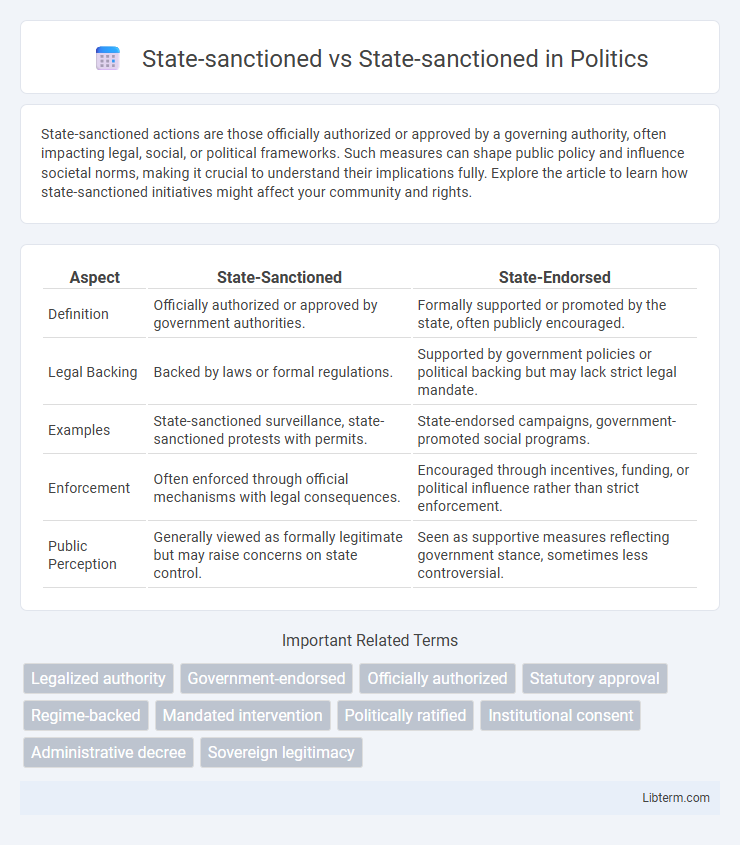State-sanctioned actions are those officially authorized or approved by a governing authority, often impacting legal, social, or political frameworks. Such measures can shape public policy and influence societal norms, making it crucial to understand their implications fully. Explore the article to learn how state-sanctioned initiatives might affect your community and rights.
Table of Comparison
| Aspect | State-Sanctioned | State-Endorsed |
|---|---|---|
| Definition | Officially authorized or approved by government authorities. | Formally supported or promoted by the state, often publicly encouraged. |
| Legal Backing | Backed by laws or formal regulations. | Supported by government policies or political backing but may lack strict legal mandate. |
| Examples | State-sanctioned surveillance, state-sanctioned protests with permits. | State-endorsed campaigns, government-promoted social programs. |
| Enforcement | Often enforced through official mechanisms with legal consequences. | Encouraged through incentives, funding, or political influence rather than strict enforcement. |
| Public Perception | Generally viewed as formally legitimate but may raise concerns on state control. | Seen as supportive measures reflecting government stance, sometimes less controversial. |
Understanding the Dual Meaning of "State-sanctioned
State-sanctioned" holds a dual meaning that hinges on context, referring either to actions authorized and approved by the government or to those officially condemned or prohibited by the state. This ambiguity requires careful interpretation in legal, political, and social discussions to determine whether the term implies endorsement or restriction. Clarity is essential when analyzing policies, law enforcement, or public statements to understand the state's actual position or level of involvement.
Historical Contexts of State-sanctioned Actions
State-sanctioned actions refer to decisions or policies formally approved and implemented by governmental authorities, often shaping societal norms and legal frameworks throughout history. Historical contexts reveal that state-sanctioned violence, such as colonial conquests and systemic racial segregation, has played a significant role in consolidating power and enforcing ideological agendas. Understanding these actions within their temporal and cultural settings provides insight into the complex interplay between authority, legality, and social control.
State-sanctioned: Legal Endorsement vs Legal Condemnation
State-sanctioned actions involve legal endorsement, granting official approval or authority to specific behaviors or policies, often reflected in government legislation or judicial rulings. Conversely, state-sanctioned can also refer to legal condemnation, where the state imposes penalties or restrictions on prohibited activities through laws and enforcement mechanisms. The dual meaning highlights the importance of context in interpreting state-sanctioned, distinguishing between state-supported legitimacy and state-imposed punitive measures.
Linguistic Ambiguity: The Paradox of State-sanctioned
The phrase "state-sanctioned vs state-sanctioned" highlights linguistic ambiguity where identical terms convey opposing meanings, creating a paradox in interpretation. This paradox arises from the dual function of "sanction" as both approval and punishment, causing confusion in legal, political, and social contexts. Resolving this ambiguity requires contextual analysis and precise language to differentiate between endorsement by the state and punitive measures imposed by the state.
State-sanctioned Violence vs State-sanctioned Protection
State-sanctioned violence involves government authorities using force or coercive measures that violate human rights, often through police brutality, military aggression, or systemic oppression. In contrast, state-sanctioned protection refers to legal frameworks and institutions established by governments to safeguard citizens' safety, such as law enforcement agencies ensuring public order and judicial systems upholding justice. The dichotomy between state-sanctioned violence and protection highlights the critical balance governments must maintain between enforcing authority and respecting individual freedoms.
Global Examples of State-sanctioned Practices
State-sanctioned practices vary globally, encompassing actions such as capital punishment in the United States, government-imposed censorship in China, and tax evasion schemes in certain offshore jurisdictions. In authoritarian regimes like North Korea, state-sanctioned surveillance and human rights abuses are prevalent, while democratic nations may endorse military interventions under international law. These examples illustrate how state-sanctioned activities reflect the political and legal frameworks unique to each country's governance and societal norms.
Impact of State-sanctioned Policies on Society
State-sanctioned policies deeply influence social structures by legitimizing specific behaviors, often shaping cultural norms and economic opportunities. These policies can reinforce systemic inequalities or promote social cohesion depending on their design and implementation. The impact on marginalized communities is particularly significant, as state-sanctioned actions may either empower or oppress based on legal and institutional frameworks.
Ethical Implications of State-sanctioned Actions
State-sanctioned actions, authorized or endorsed by government authorities, often raise significant ethical concerns due to potential abuses of power and infringement on individual rights. The ethical implications of such actions revolve around accountability, transparency, and the moral justification for state intervention in citizens' lives. Evaluating these actions requires balancing state interests with human rights principles to prevent unethical governance and protect democratic values.
Media Representation of State-sanctioned Events
Media representation of state-sanctioned events significantly influences public perception by framing these occurrences within government-approved narratives, often highlighting themes of authority, legitimacy, and order. Coverage tends to emphasize official perspectives, employing selective imagery, language, and sources that align with state interests, thereby shaping discourse and reinforcing power structures. This strategic portrayal can marginalize dissenting voices and alternative interpretations, affecting democratic engagement and societal awareness.
Clarifying State-sanctioned for Policy and Public Discourse
State-sanctioned actions refer to behaviors or practices explicitly approved or endorsed by government authorities, distinguishing them from unauthorized or informal activities. In policy and public discourse, clarifying the term state-sanctioned is essential to accurately attribute responsibility, especially in matters of law enforcement, human rights, and regulatory compliance. Precise use of state-sanctioned ensures clear accountability and aids in the differentiation between official state policies and rogue or non-state actors.
State-sanctioned Infographic

 libterm.com
libterm.com